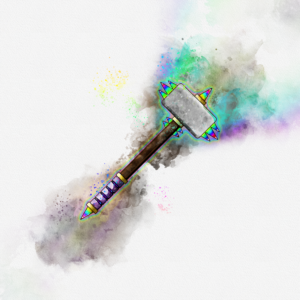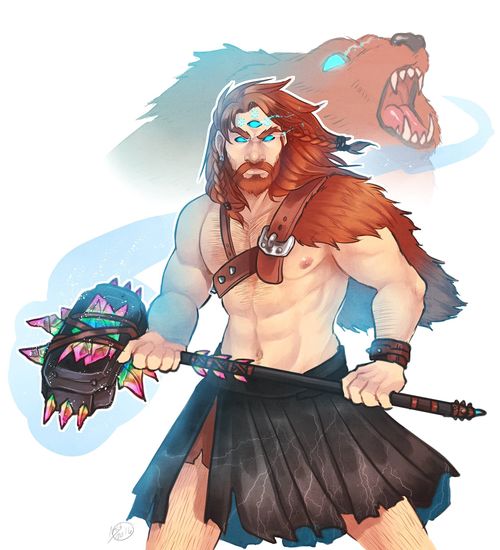Valdr
Titles: The Stormbringer
Domain: Valour, Wisdom
Symbol: Head of a hammer or large two-handed hammer with rainbow spikes
Sphere Granted: Light
Valdr controls the thunder and lightning from high above the realms in his celestial heaven of Valhalla. There in his great hall he watches the countless battles in the mortal realm. Valdr sends his angelic female warriors, the Valkyrie, to pick the bravest and most courageous of the fallen to serve him in the afterlife.
Having consumed the power of the Runes, Valdr gained wisdom beyond his years in addition to perception beyond comprehension in the form of a third eye. Gods, both dark and light, petition this wisdom when things look grim.
Appearance
Valdr takes the appearance of a young, muscular Einher man with a short auburn beard and auburn hair. Often depicted with a 3rd eye on his forehead adorned by three magical staves. He is also depicted as a large auburn Dire Bear with glowing blue eyes. He wields a massive two-handed warhammer, named Brotnabru, whose hammer’s head is embedded with shards of the Bifrost Bridge.
Tenets
Five things a follower of Valdr should do:
1. Always lead by exceptional example so that you may inspire bravery and strength in others. Be the oncoming storm to those that serve the selfish and cowardly.
2. Strive to learn from your mistakes and do not let emotions cause you to repeat them.
3. Fight with honour, courage and selflessness. If the retreat is sounded, be the last to leave the battlefield.
4. To those that face you with strength and courage, temper your justice with mercy and humility.
5. Help those that are brave enough to genuinely seek your aid.
Five things a follower of Valdr should not do:
1. Behave like a coward or out of fear for your own safety.
2. Use poisons or assassin’s tools.
3. Compromise with those that willingly accept weakness and cowardice, including those that serve gods or dragons with such qualities. Weakness of flesh is pitiable. Weakness of character is contemptible.
4. Deny anyone who wishes or requests an honourable death.
5. Act foolishly or embrace ignorance.
History
The great world tree, Yggdrasil, gave birth to five golden acorns when the realms were at the brink of destruction. There they sat, growing high in its branches. The strongest of these was Valdr the Stormbringer. Valdr was created to be a father to this family but the fates did not see it so. His son, Sverin the Albino, turned rotten and tricked Valdr in believing his wife Haldora was evil. In a blind rage, Valdr cast her down to the depths of the Deadlands where she now reigns as the Mother of Nightmares. His oldest daughter, Magnora, stolen by Sverin and hidden in a mountain, became twisted and obsessed with creating life. His youngest daughter Eindridil was cast into the great sea by the Albino and twisted into a monstrous terror. With his family shattered, Valdr was alone. He travelled the world for some time until he came upon the site of a great battle. There he found a bag of runes, powerful and beyond his understanding of magic. As he read them, the runes took hold and upon his forehead a third eye opened. These powerful runes taught Valdr wisdom beyond his years as well as healing, necromancy, power over fire, water, earth and air, love making and the banishment of malevolent mages.
Letting the power of the runes guide him, Valdr found himself in a place called Asgard that was once home to a host of powerful gods now lost to legend. A single bridge, crafted from stones that shone a multicoloured rainbow of light, gave entrance to this hallowed hall. With no family or friends to help guard this holy place, Valdr worried about those who might do harm to those in his care. He visited his would-be daughter, Magnora and requested she build him a weapon worthy of his name. In exchange for a magic rune of life creation, she fashioned a massive two-handed hammer for him named Brotnabru, Valdr returned to the Bifrost Bridge and with a single blow of his mighty weapon, shattered it. Shards of the rainbow bridge still remain, embedded, in the head of his magic weapon. With his new celestial home protected, Valdr took his seat in the great hall, claiming it as his own. From there he commands a host of female angels called Valkyrie who search the mortal realm for the spirits of warriors who have died valiantly in battle. They are taken to the great hall called Valhalla where Valdr trains them for the battles that may come.
Celestial Heaven: Asgard
The natural landscape of Asgard would be familiar to most Einer, at least those that remember their ancestral homeland of Mjoll. Tall cliffs leer over tempestuous waves hundreds of feet below, and a thick forest of evergreen trees crowned with a light dusting of snow stretches as far as the eye can see. The great halls and fortresses of Asgard rise from the forest like drowsy Jotun, and it is said that the pinnacle of Valhalla can be seen from all corners of the Realm.
Valdr has a rather dim view of the so-called God of Justice and does not permit the light of Kael’s sun in his Realm. Instead, the day’s light is provided by a mighty chariot crewed by two of his greatest Valkyries. This chariot drags a flaming orb of truly awe-inspiring size as it soars across the horizon, and its light mimics the glow of the sun in all of its aspects.
When a young Valdr made his way into Asgard, he found a vast Celestial Heaven that was almost entirely empty. As the timid and confused Spirits of mortals once sworn to now-dead gods surrounded him, he realised that this was a realm that once housed an entire pantheon, and now he stood alone as its only divine presence. Presented with a plethora of choices, Valdr claimed the Great Hall of Valhalla as his personal seat and as a final reward for the heroes that died in his name. As heroes feast and battle, his other faithful work diligently in the newly erected Stormforges, where they craft the lightning and thunder that rides to the aid of his faithful.
Yet, despite all of this activity, much of Asgard remains empty still. Valdr has warded off much of his Celestial Realm, as even he cannot be sure of dangers still lie within the realms of dead gods.
Realms Within Asgard
- Valhalla
Often, even in the days of yore, Valhalla was the greatest of Asgard’s mighty halls. Five hundred and forty doors open out into the fields before it, the heads of fearsome beasts carved into their decorative crossbeams. Its rafters are spears fit for a giant, and its roof is thatched with the shields of the fallen. Inside its massive interior, a countless array of weapons and armour line the walls, ready to be taken up at a moment’s notice. Thousands upon thousands of vast dining tables lined with cushioned benches stand ready for the evening feast, where Valdr’s warriors drink the enchanted mead that flows from the udders of the goat Heiðrún as they feast upon the ever-growing flesh of the boar Sæhrímnir. Raucous chants, bardic songs, and the fights that arise when you pack thousands of violent drunks into one room are quite common during these feasts.
In front of them lies the Everbattle, a vast field where the courageous warriors of Valhalla hone their skills by killing each other from sunrise to sunset. Those who were favoured by Valdr in life often form these raucous Spirits into warbands that they pit against each other, testing their wisdom and strategy just as much as their own individual skills and courage. Once the sun at last sets and sinks over the horizon, the warriors of Valdr see their wounds healed, and those “killed” are restored back to life.
Only those that die honourably in battle are taken by the Valkyries into his halls. Those who have resorted to dishonourable tactics in life, or those who have not met their end courageously, are left to the waters of the Black Tide or, worse, into Haldora’s domain. However, in the event of an otherwise honourable warrior dying as the result of a surprise attack or some other demise that lacks true honour, those who were close to the deceased can also perform an audacious and heroic deed in the name of the fallen to ensure their arrival in the halls, thus showing to Valdr that the deceased has lived a life capable of inspiring others to great feats of courage.
- The Stormforge
When the Bifrost Bridge was whole, it traversed every Realm, providing effortless interplanar passage in either direction. Had the Stormbringer known about the chaos magic that his young son Sverin had embedded into the rainbow bridge during his first and only visit to Asgard, he may have second-guessed his decision to destroy it. Yet, destroy it he did. The resulting aftershocks violently reverberated throughout the planes. The ground shook with rage, and the very air cried out in pain. The planar barriers in Asgard held, but only just.
When the dust had settled, the young God saw what the Trickster had wrought. While the bridge’s destruction had fortunately failed to completely sunder the barriers between the realms, Sverin’s magic tore countless planar rifts in the sky of Asgard. Some of these were easily closed or otherwise dealt with, but several rifts, in particular, were not so easily dealt with. Massive roiling waves of pure elemental energy are continuously pouring forth from the elemental planes at all times, and no matter how hard he has laboured, Valdr has not been able to close these particular rifts. To make matters worse, if these energies were ever allowed to combine with the remaining shards of the Bifrost Bridge, the resulting tumultuous reactions might tear Valhalla and the rest of the Celestial Heavens apart.
The Stormforge was Valdr’s answer to this dilemma. Here the Stormbringer, along with countless mortal Spirits, shapes and forms these energies into the many fierce storms that blanket the various planes. While preserving the remaining integrity of the planes is their primary purpose, these storms often serve secondary goals. Ice elven slave ships are regularly confounded by bad weather, while sudden squalls cover the retreat of Einish warriors forced to quit the battlefield.



